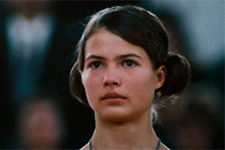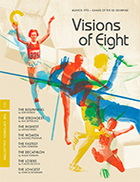Visions of Eight
|  Visions of Eight is nothing if not ambitious. In documenting the 1972 Olympics in Munich, West Germany—the first time the Olympics had been held in Germany since the 1936 Games under the shadow of Adolf Hitler—it does not aim for comprehensiveness in its coverage or even coherence in its approach. The idea was not to document the Olympics, but rather to use the Olympics as a showcase for the visions of a diverse range of film artists. Bringing together some of the greatest filmmakers from around the world and allowing them to focus on one aspect of the Olympics turned the film into a kind of anthology art-documentary—in other words, something entirely unique. The film’s approach was engineered by executive producer David L. Wolper, who was already a veteran of television documentaries with more than a decade of experience and an Emmy for The Making of the President 1960 (1963), although his greatest achievement would arguably be his pioneering 12-hour miniseries Roots (1977), which set records for television viewership, became a cultural touchstone in expanding the country’s understanding and recognition of the legacy of slavery, and legitimized the docudrama approach of blending fact and fiction. At the time, Wolper had most recently produced the musical Willy Wonka and the Chocolate Factory (1971) starring Gene Wilder. That film was shot at the Bavaria Studios in Munich, which led to his being asked to helm the official documentary of the ’72 Games, the first time someone not from the host country had been put in charge of the official Olympics film. Wolper’s willingness to buck tradition, go against expectations, and experiment with form was clear in Visions of Eight, which stands out as one of the most unique entries in the storied annals of Olympics documentary filmmaking (which include, of course, Leni Riefenstahl’s Olympia and Kon Ichikawa’s Tokyo Olympiad). While the project was originally envisioned to have ten directors, Wolper ended up with eight—an eclectic group of artists who stayed true to his diverse vision of creating a film that, in his words, would “capture the feeling of the Olympics,” rather than just be “straight reportage.” Wolper approached a who’s who roster of international art film directors, which originally included Italian director Federico Fellini, Swedish director Ingmar Bergman, and Senegalese director Ousmane Sembène, the latter of whom shot a segment about the Senegalese basketball team that wasn’t included in the final film because, according to Wolper, it was never completed. Fellini was the first filmmaker Wolper approached, and while he declined to contribute, he did offer to pretend that he would in order to help secure the participation of others. Bergman, on the other hand, would never meet with him. The final film includes eight segments: “The Beginning” by Soviet director Yuriy Ozerov, who had most recently directed the war film Liberation: The Last Assault (1971) and would go on to document the 1980 Moscow Olympics; “The Strongest” by Swedish actress-turned-director Mai Zetterling, who had worked with Ingmar Bergman in the 1940s and ran into controversy over the sexually explicit content in her directorial debut Loving Couples (1964); “The Highest” by U.S. director Arthur Penn, who was at the height of his zeitgeist-seizing artistry following Bonnie and Clyde (1967), Alice’s Restaurant (1969), and Little Big Man (1970); “The Women” by German director Michael Pfleghar, who had directed dozens of made-for-television documentaries and movies; “The Fastest” by Japanese director Kon Ichikawa (The Burmese Harp, Fires on the Plain), who had already helmed the documentary of the 1964 Tokyo Olympics; “The Decathlon,” by Czech director Milos Forman, who had recently directed his first English-language film, the counterculture comedy Taking Off (1971) and would next take home an armful of Oscars for One Flew Over the Cuckoo’s Nest (1975); “The Losers” by French director Claude Lelouch, whose A Man and a Woman (1966) had won the Palme d’Or at Cannes and was nominated for several Oscars; and, finally, “The Longest” by British director John Schlesinger, who had recently won multiple Oscars for Midnight Cowboy (1969) and had most recently helmed the trailblazing bisexual drama Sunday Bloody Sunday (1971). Each director took a different approach to their chosen subject, and one of the film’s pleasures is the way in which it is constantly switching gears, giving us different perspectives on not just the games themselves, but the very nature of human endurance and high-level competition. For example, as Zetterling, who initially turned down Wolper’s invitation to contribute to the film, noted, she wasn’t so much interested in the sport of weightlifting as she was in the obsessive nature of the competitors and how involved they become in their endeavors. And, while there is some conventional “sports documentary” moments, the film as a whole leans more toward a canted view of the Olympics, which we see in Lelouch’s fascinating and poignant “The Losers,” which focuses entirely on the response of athletes upon realizing they have not won the medal, or Ozerov’s segment “The Beginning,” which looks at the many rituals and habits athletes use to prepare themselves in the moments before competing. The freedom of the filmmakers to choose their own subject matter also gives the film an added edge, with some directors going against expectations (such as Zetterling, who was known for the centrality of politics and feminism in her films, not making the segment on female athletes) and others making their choices at the very last minute (Penn’s focus on pole-valuting came about because he had to abandon his original subject, controversial American flyweight boxer Bobby Lee Hunter, who lost his qualifying match). The film is hampered at times by the fact that the directors ultimately had to cede control of their segments to Wolper and his army of editors, who at times impose convention where it might not otherwise fit. There are also a few genuinely poor choices, such as a slow-motion montage of jockeys falling off their horses in Lelouch’s segment, the pratfall quality of which contrasts badly with the intimate close-ups of frustrated and devastated athletes that otherwise defines the segment. Wolper also wanted the filmmakers to steer away from the most notorious aspect of the Munich games, which was the Palestinian Black September terrorists’ taking of 11 Israeli athletes and coaches and their subsequent deaths during a botched raid. For the most part he was successful (much to the chagrin of critics and audiences, who felt it inappropriate to try to avoid the subject), although Schlesinger insisted on making it a major element of his segment, which otherwise offered an intimate portrait of British long-distance runner Ron Hill. Thus, while Visions of Eight is not a perfect experiment in melding diverse artistry into a single document, it remains a fascinating achievement that still stands for its willingness to subvert expectations and find new perspectives on familiar subjects.
Copyright © 2021 James Kendrick Thoughts? E-mail James Kendrick All images copyright © The Criterion Collection | |||||||||||||||||||||||||||||
Overall Rating: 


 (3.5)
(3.5)


